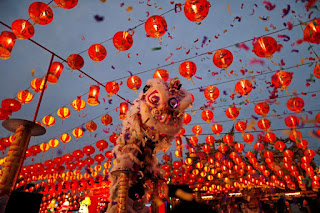Lucky Dishes For Chinese New Year
Lucky Dishes For Chinese New Year
This month, millions of people has celebrated Chinese New Year. Lots of decorations, fireworks, and red lanterns were displayed to add the ambience of Chinese New Year. This year, Chinese New Year began on 16 February because it marks the start of lunar new year, which is when there is a start of new moon. The date of Chinese New Year changes every year, but it will always be around January and February. Next year, the celebration will start on 5 February, it'll be slightly earlier compared to this year's.
People usually have dinner with their family on Chinese New Year Eve. It is called The Reunion Dinner and is believed to be the most important meal of the year. Big families of several generations sit around round tables and enjoy their time together. Dishes with lucky meanings must be included for The Reunion Dinner.
Fish - an Increase in Prosperity
In Chinese, "fish" (鱼 Yú /yoo/) sounds like 'surplus'. Chinese people always like to have a surplus at the end of the year, because they think if they have managed to save something at the end of the year, then they can make more in the next year.
Spring Rolls - Wealth
Spring rolls (春卷 Chūnjuǎn /chwnn- jwen/) get their name because they are traditionally eaten during the Spring Festival. It is a dish especially popular in East China: Jiangxi, Jiangsu, Shanghai, Fujian, Guangzhou, Shenzhen, Hong Kong, etc.
With a history of more than 1,800 years, dumplings (饺子 Jiǎozi /jyaoww-dzrr/) are a classic Chinese food, and a traditional dish eaten on Chinese New Year's Eve, widely popular in China, especially in North China.Chinese dumplings can be made to look like Chinese silver ingots (which are not bars, but boat-shaped, oval, and turned up at the two ends). Legend has it that the more dumplings you eat during the New Year celebrations, the more money you can make in the New Year.
Glutinous Rice Cake - a Higher Income or Position
In Chinese, glutinous rice cake (年糕 Niángāo /nyen-gaoww/) sounds like it means "'getting higher year-on- by year"'. In Chinese people's minds, this means the higher you are the more prosperous your business is a general improvement in life. The main ingredients of niangao are sticky rice, sugar, chestnuts, Chinese dates, and lotus leaves.
Sweet Rice Balls - Family Togetherness
Sweet rice ball (汤圆 Tāngyuán /tung-ywen/) is the main food for China's Lantern Festival, however, in south China, people eat them throughout the Spring Festival. The pronunciation and round shape of tangyuan are associated with reunion and being together. That's why they are favored by the Chinese during the New Year celebrations.
Longevity Noodles - Happiness and Longevity
Longevity noodles (长寿面 Chángshòu Miàn /chung-show myen/) unsurprisingly symbolize a wish for longevity. Their length and unsevered preparation are also symbolic of the eater's life.
Good Fortune Fruit - Fullness and Wealth
Certain fruits are eaten during the Chinese New Year period, such as tangerines and oranges, and pomeloes. They are selected as they are particularly round and "golden" in color, symbolizing fullness and wealth, but more obviously for the lucky sound they bring when spoken.
Author : Josephine Andrea
Information Source : https://www.chinahighlights.com/travelguide/chinese-food/chinese-new-year-food.htm
Image Sources : https://www.thesun.co.uk/news/5224493/chinese-new-year-2018-animals-year-of-dog-zodiac/https://omnivorescookbook.com/recipes/authentic-chinese-steamed-fish
https://www.recipetineats.com/spring-rolls/
https://www.chinasichuanfood.com/sticky-rice-cake-with-red-bean-paste/https://food52.com/recipes/10169-glutinous-rice-balls-with-black-sesame-filling
https://food52.com/recipes/10169-glutinous-rice-balls-with-black-sesame-filling
https://cooking.nytimes.com/recipes/1013451-longevity-noodles-with-chicken-ginger-and-mushrooms
https://www.indoindians.com/7-special-chinese-new-year-dishes/







Comments
Post a Comment